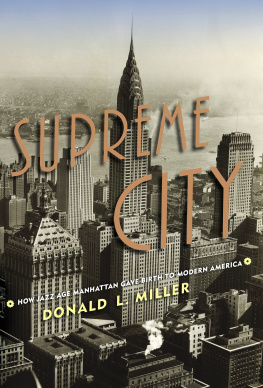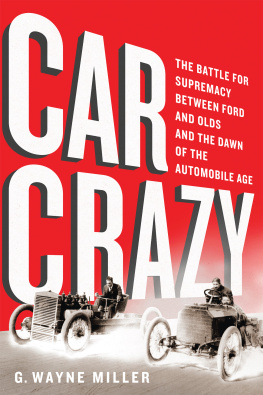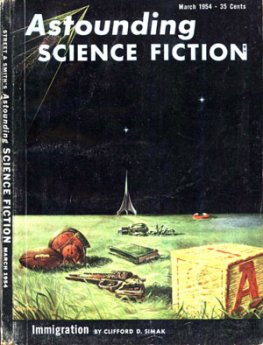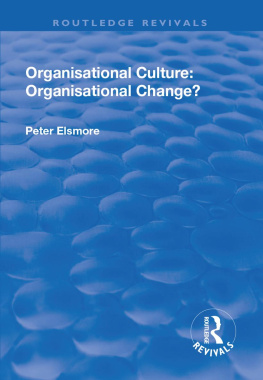Miller - Change Your Space, Change Your Culture
Here you can read online Miller - Change Your Space, Change Your Culture full text of the book (entire story) in english for free. Download pdf and epub, get meaning, cover and reviews about this ebook. City: New York, year: 2014, publisher: John Wiley & Sons Inc, genre: Business. Description of the work, (preface) as well as reviews are available. Best literature library LitArk.com created for fans of good reading and offers a wide selection of genres:
Romance novel
Science fiction
Adventure
Detective
Science
History
Home and family
Prose
Art
Politics
Computer
Non-fiction
Religion
Business
Children
Humor
Choose a favorite category and find really read worthwhile books. Enjoy immersion in the world of imagination, feel the emotions of the characters or learn something new for yourself, make an fascinating discovery.

Change Your Space, Change Your Culture: summary, description and annotation
We offer to read an annotation, description, summary or preface (depends on what the author of the book "Change Your Space, Change Your Culture" wrote himself). If you haven't found the necessary information about the book — write in the comments, we will try to find it.
Change Your Space, Change Your Culture — read online for free the complete book (whole text) full work
Below is the text of the book, divided by pages. System saving the place of the last page read, allows you to conveniently read the book "Change Your Space, Change Your Culture" online for free, without having to search again every time where you left off. Put a bookmark, and you can go to the page where you finished reading at any time.
Font size:
Interval:
Bookmark:
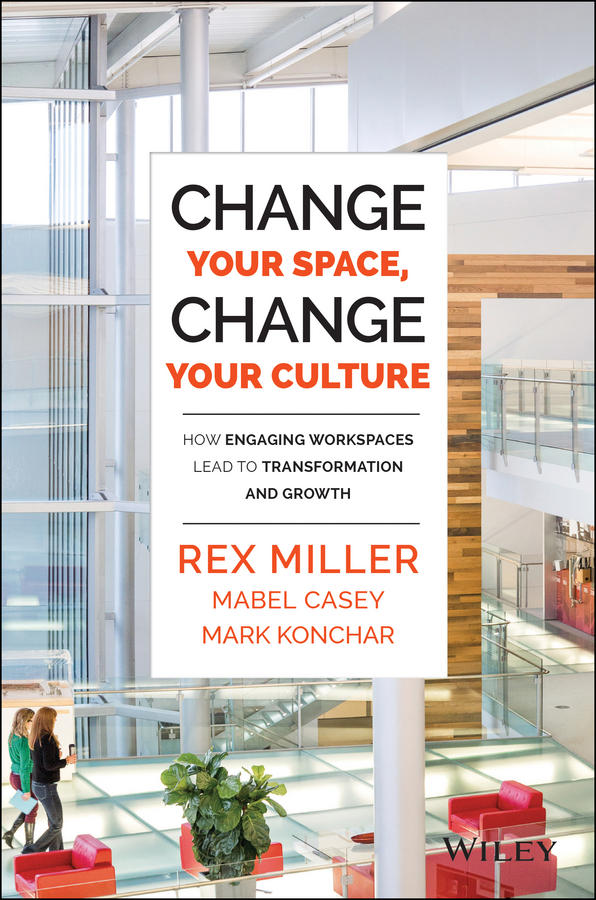
We're leaving behind a complicated world that operated like a machine, to a much more complex world that operates more like an ecosystem, he states, in a nutshell, the big idea behind workplaces that work in a hyperconnected world.
Susan S. Szenasy
Publisher and Editor-in-Chief
Change Your Space clearly articulates the power of technology as an influential business tool inside the workspace. It illustrates the importance of helping employees connect and collaborate to improve their productivity. Technology is rapidly evolving, affecting the way people think and work in their office environment. The key points that Mr. Miller and his coauthors present are among the leading concepts for the future of the workplace.
Lew Horne
President of CBRE, Greater Los AngelesOrange County
This book is an excellent treatise on a topic that has been long underserved. Every CEO should be personally involved in the design of the work environment, and this is the book to read if you want to understand why that's important, what you should care about and how to proceed.
Dave Gray
author of The Connected Company
Change Your Space will transform the way you think about workspace. An insipid workspace is worse than a lost opportunity; it is a lodestone in a world where companies must innovate to survive. This book offers actionable insights and real world examples to demonstrate how and why your workspace is critical for forming, shaping, and retaining the sort of team and culture required for success. I found it so compelling that I'm planning to incorporate the book into my Building Innovation Teams and Cultures MBA course at Kellogg.
Joe Dwyer
Partner at Founder Equity and Digital Intent; and teacher of innovation at Northwestern University Kellogg School of Management
Miller and his fellow research team are great investigative reporters. The goal of their investigation is to find out why 70 percent of today's workforce feel disengaged and why we are locked in an antiquated industrial era culture that has little to do with today's increasingly highly networked, team-based, and transparent reality. The authors' modus operandi for accomplishing this task is to study more than 20 companies that have achieved a degree of innovation, collaboration, engagement, agility, and sustainability. Although there is no single road map for achieving this new culture, the book provides numerous insights into creating an innovative culture that reflects the emerging nature of work and the workplace.
Eric Teicholz
IFMA Fellow, Director, Board of Directors
Change Your Space is a profound book that any leader interested in employee engagement and innovation should read. Given my career in commercial real estate, it was refreshing to see a research-based analysis of how to use office space as a catalyst for improving a company's culture. Our industry has been very slow to adapt and change, but I believe that is about to change. Change Your Space makes it clear that every company can improve their work place environments and achieve stunning results. Any company that does not change will increasingly be left behind in the ever more competitive race to attract and retain talent.
Richard Kincaid
former President and Chief Executive Officer of Equity Office Properties Trust
Everything has or is changing: phones, computers, TVs, cars, music, communication. Office space has not changed for many decades and needs to be rethought for a new age. Change Your Space leads the way in reimagining why and how our offices need to change.
Pat Sullivan
cofounder of ACT! Software and CEO of Contata
Having taken a small startup venture to a NYSE listed company in five years, we faced constant change in applying our disruptive methods to a legacy industry. This book gets at the underlying connections of behavior, culture, and workplace and their impact on execution in the face of broad changes now happening across the economy.
Doug Brien and Gary Beasley
Co-CEOs, Starwood Waypoint Residential Trust.
Change Your Space uncovers the next dimension of the triple bottom linewhere success is inherently rooted in a culture of rich engagement in the workplace. While this requires a somewhat complex formula, the brain trust behind this book has outlined a very clear business case for environments that foster collaboration and innovation. As society continues to evolve at lightning speed, healthy, vibrant work environments are within reachthanks to this forward-thinking, thought-provoking, must-read book.
Barbie Wentworth
President and CEO of MB Advertising
As a two-time CEO of dynamic, fast-growth, tech companies I never underestimated the importance of physical space in energizing the people and driving culture; Rex's team gets it. This book is a must-read for leaders who want to compete in the new business climate and get their employees out of cubicle purgatory.
Bob Vanech
founding Board Member of the 2020 Los Angeles World's Fair
I am a proponent of matching the workplace to the culture to sustain innovation and creativity. Hill & Wilkinson has created a new position for a Culture Manager to assure that our corporate actions align with our culture. Case4Space is right on target with their thoughts about the importance of culture.
Greg Wilkinson
Co-Chairman of Hill & Wilkinson
Rex Miller and his collaborators have created an important book that has the boldness to propose that workspace can be used as an agent of change. Change Your Space, Change Your Culture is a thought-provoking publication that should be read by not just designers and architects, but anyone involved in leading organizations.
Michael Schley
CEO and Founder, FM:Systems, Chair, Workplace Strategy Summit
As business leaders we have the unique opportunity and duty to positively affect today's working culture. It is literally changing before our eyes. Change Your Space provides live examples and a road map for transforming static culture and becoming the innovative organizations our people will love to work in.
Patrick Sean Kelley
Chief Creative Officer MARTZPARSONS
This is a fascinating exploration of the multiple ways our work environments are hindering or helping us get things done. Rex Miller has done a remarkable job of chronicling the significant changes afoot in our culture and their impact on consciousnessa terrific treaty on the power that form has on function.
David Allen
author of Getting Things Done
Cover image: Haworth
Cover design: Wiley
Copyright 2014 by Rex Miller, Mabel Casey, and Mark Konchar. All rights reserved.
Published by John Wiley & Sons, Inc., Hoboken, New Jersey.
Published simultaneously in Canada.
No part of this publication may be reproduced, stored in a retrieval system, or transmitted in any form or by any means, electronic, mechanical, photocopying, recording, scanning, or otherwise, except as permitted under Section 107 or 108 of the 1976 United States Copyright Act, without either the prior written permission of the Publisher, or authorization through payment of the appropriate per-copy fee to the Copyright Clearance Center, 222 Rosewood Drive, Danvers, MA 01923, (978) 7508400, fax (978) 6468600, or on the web at www.copyright.com. Requests to the Publisher for permission should be addressed to the Permissions Department, John Wiley & Sons, Inc., 111 River Street, Hoboken, NJ 07030, (201) 7486011, fax (201) 7486008, or online at www.wiley.com/go/permissions.
Next pageFont size:
Interval:
Bookmark:
Similar books «Change Your Space, Change Your Culture»
Look at similar books to Change Your Space, Change Your Culture. We have selected literature similar in name and meaning in the hope of providing readers with more options to find new, interesting, not yet read works.
Discussion, reviews of the book Change Your Space, Change Your Culture and just readers' own opinions. Leave your comments, write what you think about the work, its meaning or the main characters. Specify what exactly you liked and what you didn't like, and why you think so.

